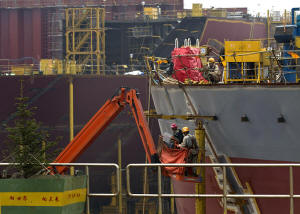China's shipbuilding dominance poses economic and national security
risks for the US, a report says
[March 12, 2025] By
DIDI TANG
WASHINGTON (AP) — In only two decades, China has grown to be the
dominant player in shipbuilding, claiming more than half of the world's
commercial shipbuilding market, while the U.S. share has fallen to just
0.1%, posing serious economic and national security challenges for the
U.S. and its allies, according to a report released Tuesday by the
Center for Strategic and International Studies.
In 2024 alone, one Chinese shipbuilder constructed more commercial
vessels by tonnage than the entire U.S. shipbuilding industry has built
since the end of World War II. China already has the world's largest
naval fleet, the Washington-based bipartisan think tank said in its
75-page report.
“The erosion of U.S. and allied shipbuilding capabilities poses an
urgent threat to military readiness, reduces economic opportunities, and
contributes to China's global power-projection ambitions,” the report
said.
Concerns about the poor state of U.S. shipbuilding have been growing in
recent years, as the country faces rising challenges from China, which
has the world's second largest economy and has ambitions to reshape the
world order. At a congressional hearing in December, senior officials
and lawmakers urged action.
Last week, President Donald Trump told Congress that his Republican
administration would “resurrect" the American shipbuilding industry, for
commercial and military vessels, and he would create "a new office of
shipbuilding in the White House.”
“We used to make so many ships," Trump said. "We don’t make them anymore
very much, but we’re going to make them very fast, very soon. It will
have a huge impact."

In February, the heads of four major labor unions called on Trump to
boost American shipbuilding and enforce tariffs and other “strong
penalties” against China for its increasing dominance in that sector.
“What we are seeing now is a recognition of the strategic significance
of shipbuilding and port security, and the related challenges posed by
China,” said Matthew Funaiole, a senior fellow in the China Power
Project at CSIS and a co-author of the report. Funaiole said concerns
over shipbuilding are “a fairly bipartisan issue."
[to top of second column] |

Workers construct the hull of a vessel at the STX shipbuilding plant
on Changxing Island, on the outskirt of Dalian, in northeast China's
Liaoning province, Sept. 15, 2011. (AP Photo/Andy Wong, File)
 The report said that China's
shipbuilding sector went through “a striking metamorphosis” in the
past two decades, transforming from a “peripheral player” to the
dominant player on the global market, with efforts centered on one
state-owned enterprise: China State Shipbuilding Corporation, or
CSSC.
At the same time, China has greatly expanded its navy. Last year, a
CSIS assessment found that China was operating 234 warships,
compared with the U.S. Navy's 219, although the U.S. continued to
hold an advantage in guided missile cruisers and destroyers.
In developing recommendations for the U.S. to compete with China,
the researchers zoomed in on the Chinese company's use of Beijing's
“military-civil fusion” strategy, which blurs the lines between the
country's defense and commercial sectors.
They found that CSSC, which builds both commercial and military
ships, sells three-quarters of its commercial production to buyers
outside China, including to the U.S.-allied Denmark, France, Greece,
Japan and South Korea. These foreign firms are thus funneling
billions of dollars to Chinese shipyards that also make warships,
advancing China's modernization of its navy and providing Chinese
defense contractors with key dual-use technology, the report said.
The CSIS researchers suggested that, as a long-term fix, the U.S.
should invest in rebuilding its shipbuilding industry and work with
allies to expand shipbuilding capacities outside China. For the near
term, they recommended actions to level the playing field and
“disrupt China’s murky dual-use ecosystem,” such as by charging
docking fees on Chinese-made vessels and cutting U.S. financial and
business ties with CSSC and its subsidiaries.
The Trump administration has proposed new fees on China-linked
vessels calling on U.S. ports. A BlackRock-led consortium last week
agreed to acquire stakes in 43 ports across the globe, including the
two ports on either side of the Panama Canal, from a Hong Kong-based
conglomerate.
All contents © copyright 2025 Associated Press. All rights reserved |